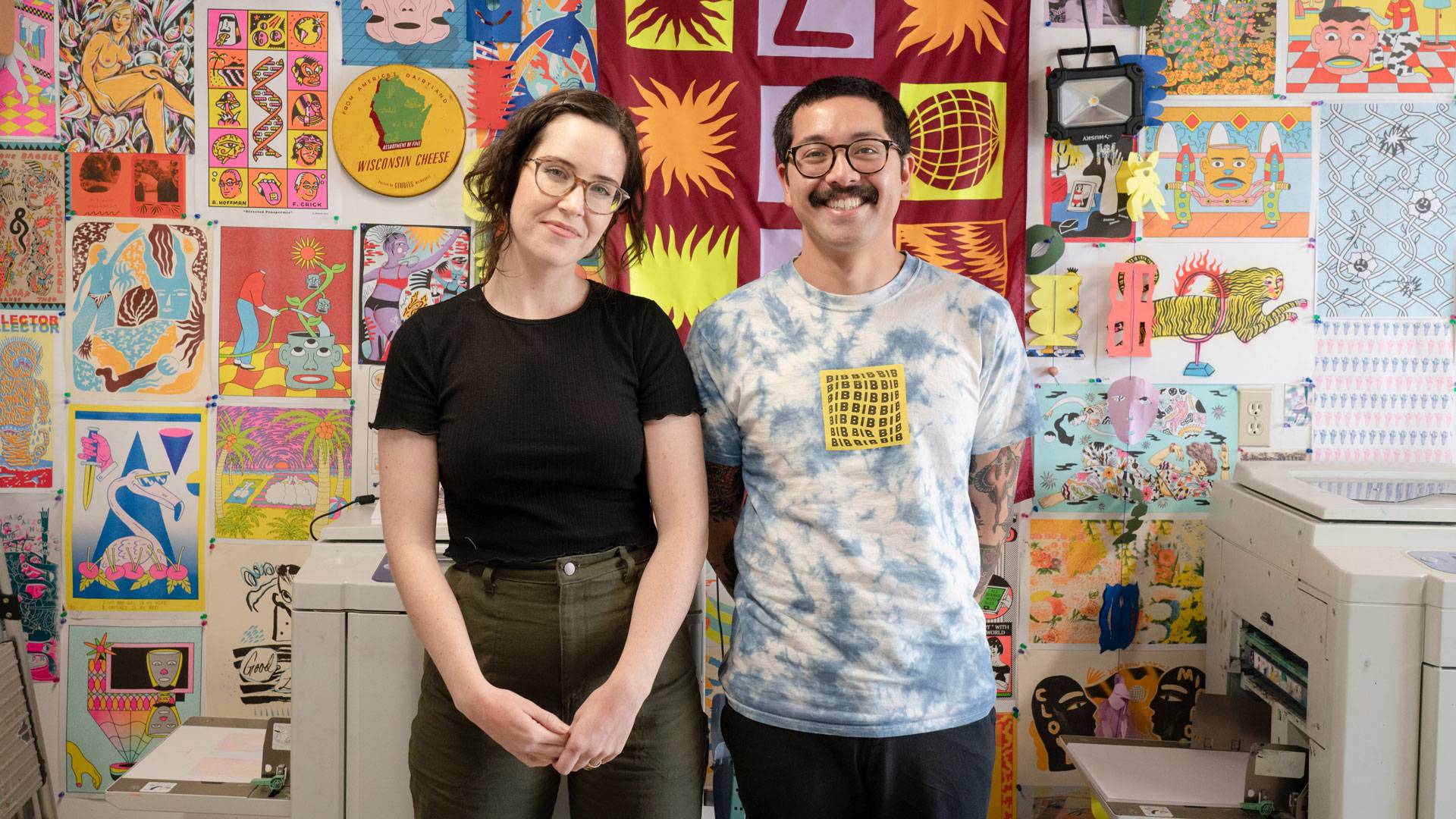Between the two of them, Meg Fransee and Aaron Gonzalez have five jobs.
Life in a Two-Bedroom Book Printing Factory
Fransee works full time as a social worker with the Oakland Unified School District, and part time as a psychotherapist at a clinic in San Francisco. Gonzalez works in customer support in tech, commuting from Oakland to Mountain View four days a week. And then, during their free nights and weekends, they both run Floss Editions, printing and publishing their own art books along with other artists’ output, selling their wares at zinefests and fairs.
“We work eight-hour days and then we come home and do another six to eight hours,” Gonzalez says, pointing out that Fransee’s days are often longer than his. “It’s like a second job. We feel compelled to do this.”
Last year, Floss Editions made just over $29,000 in sales and spent just over $23,000 on ink, paper, travel to and from fairs, tabling fees, and blank shirts and totes. That net of about $6,000 will stay in their Floss bank account to fund future projects; Gonzalez estimates it costs them between $1,500 and $3,000 to make each book, which they print in editions of around 200.
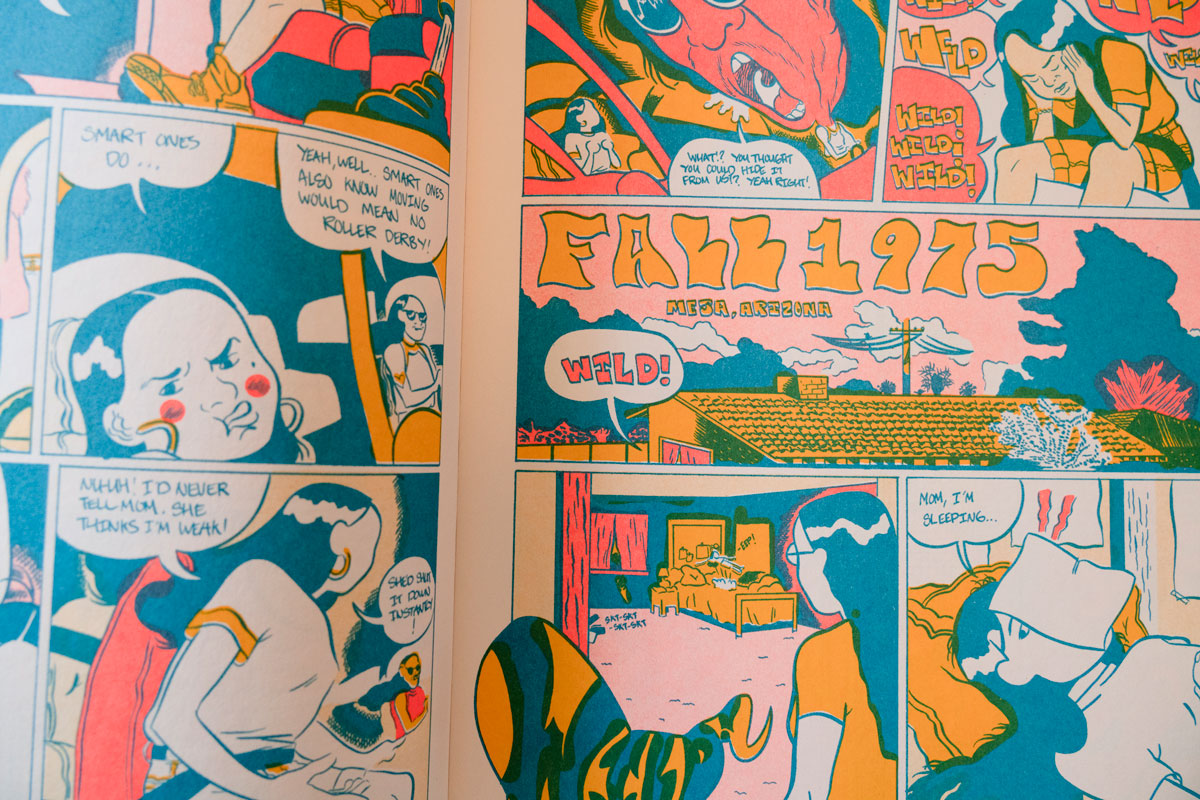
“I was actually impressed when we did look at what Floss did in 2019,” Fransee says, “it was a lot more than I thought.”
They’re able to sustain Floss on this margin of profit because, like many artists in the Bay Area, their creative work isn’t their primary source of income. Fransee makes $62,000 a year in her OUSD job, and Aaron has what he describes as “a regular tech salary,” which means he makes six figures. They pay their $2,700-a-month rent out of their own personal finances, subsidizing Floss’ studio space in their two-bedroom home.
The line between home and studio is blurry. One half of their garage is set aside for printing equipment and one bedroom is reserved for Fransee’s illustration and painting. Gonzalez has a computer workstation of his own off the kitchen. A stack of drying perfect-bound books lives in the dining room, weighted down with dumbbells. Unfolded spreads wait in stacks on the table, next to plastic bottles of archival glue. The living room doubles as a collation zone. Finished books line their shelves.
“When you come home, all this stuff is out all the time. It almost feels like you never really leave work,” Gonzalez says. But for now, that’s exactly the way they want it.
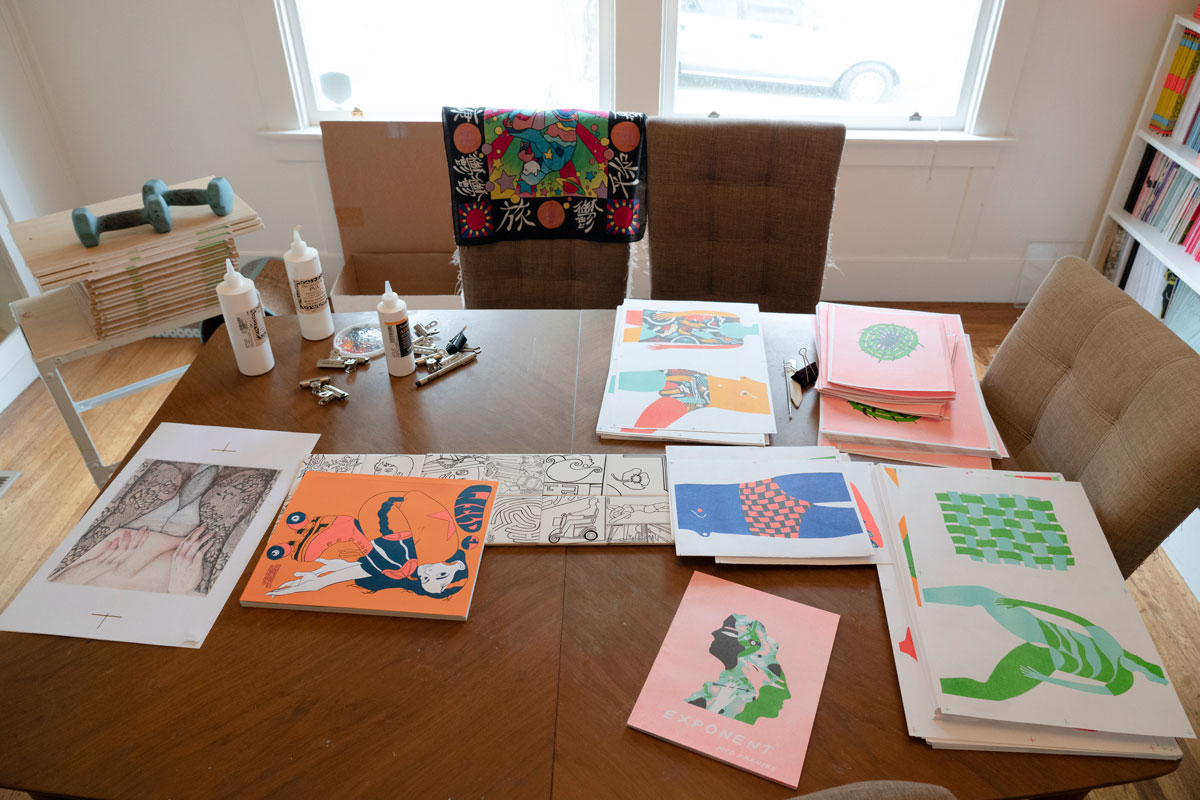
‘We Never Pay Ourselves Back’
The couple started Floss in 2016, when they purchased their first Risograph printer off Craigslist for $500. The Riso, popular with artists and zine-makers, is essentially an automated screen printer that looks like a photocopier. The machine rapidly pushes colored ink through a rotating drum covered in a stencil as sheets of paper pass through it. Prints fly out of the Riso and land in the receiving tray with a thunk, up to 150 pages per minute. Floss now has two Risos: one that prints two colors at a time (this one cost them $2,000), the other, a backup machine in case something goes haywire, prints one color at a time (purchased for $1,300).
Last year alone, Floss published 10 books (Fransee and Gonzalez say they would have done more, but they were also busy getting married) and participated in nine fairs, some as far away as Tokyo and Austin. They estimate about 30% of their output is their own work—Fransee draws and paints, Gonzalez makes drawings in Illustrator—and the rest is a result of partnerships with other artists, many of whom have never worked in printmaking or bookmaking before.
“I think a lot of what drives us is the dissemination of this work,” Gonzalez says of taking intangible or unique artworks and turning them into multiples.
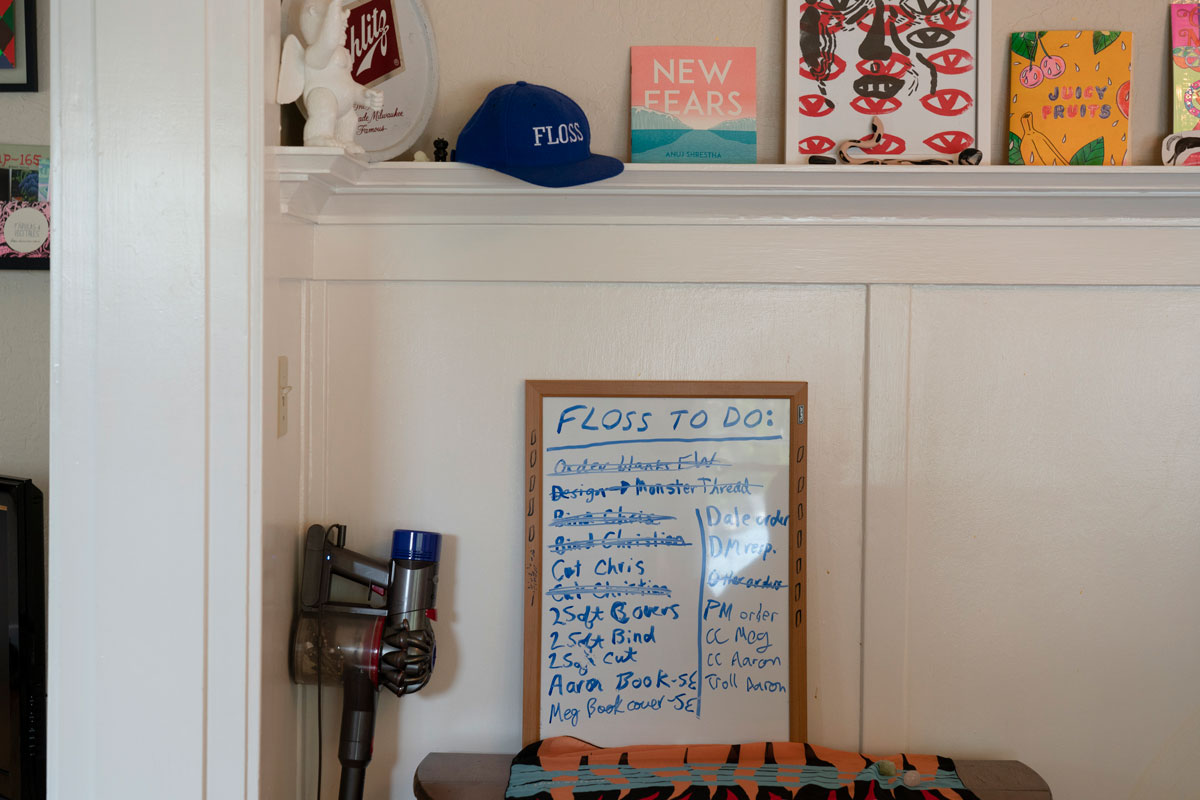
One of their 2019 publications is 2 Soft, a collection of flash from tattoo artist Theodore Giordano. The 13-by-11-inch perfect-bound book has covers screen printed by Night Diver Press and pages filled with illustrations precisely printed in fluorescent orange and pink, aqua, yellow, black, mint and sunflower (a warm yellow). Those pages passed through the Riso at least four times, but the registration is tight.
Once Gonzalez is finished printing and Fransee hand-binds a publication, they split each edition with the artist. “I don’t think we were ever intentional with the finances of 50–50, it just seemed the most fair to us,” Fransee says. This lets Floss cover their material costs and usually come out a bit ahead, money that goes back into the bank account for future projects. The artists get to keep 100% of the sales from their own half of the edition.
This split, and their affordable pricing structure—most Floss publications are $10–$15, while the most pricey is Giordano’s book at $65—might not be possible if they relied on the business to cover more than its own expenses.
“Labor is something that we obviously don’t factor in at all,” Gonzales explains. “We never pay ourselves back.” Fransee estimates it takes her 15 minutes to fold and bind each book. For an edition of 200, that’s 50 hours of labor. Their day jobs limit the amount of time they can spend on Floss, and as a result, the number of books they can make in a given year.
But Gonzalez, who never thought of himself as an artist before he started making work for Floss, also looks at it another way. “I think not having the constraints of having to make money from this has allowed us to take more risks,” he says. “We can take chances on projects that might not be successful because we personally feel they’re worthwhile to put into the world.”
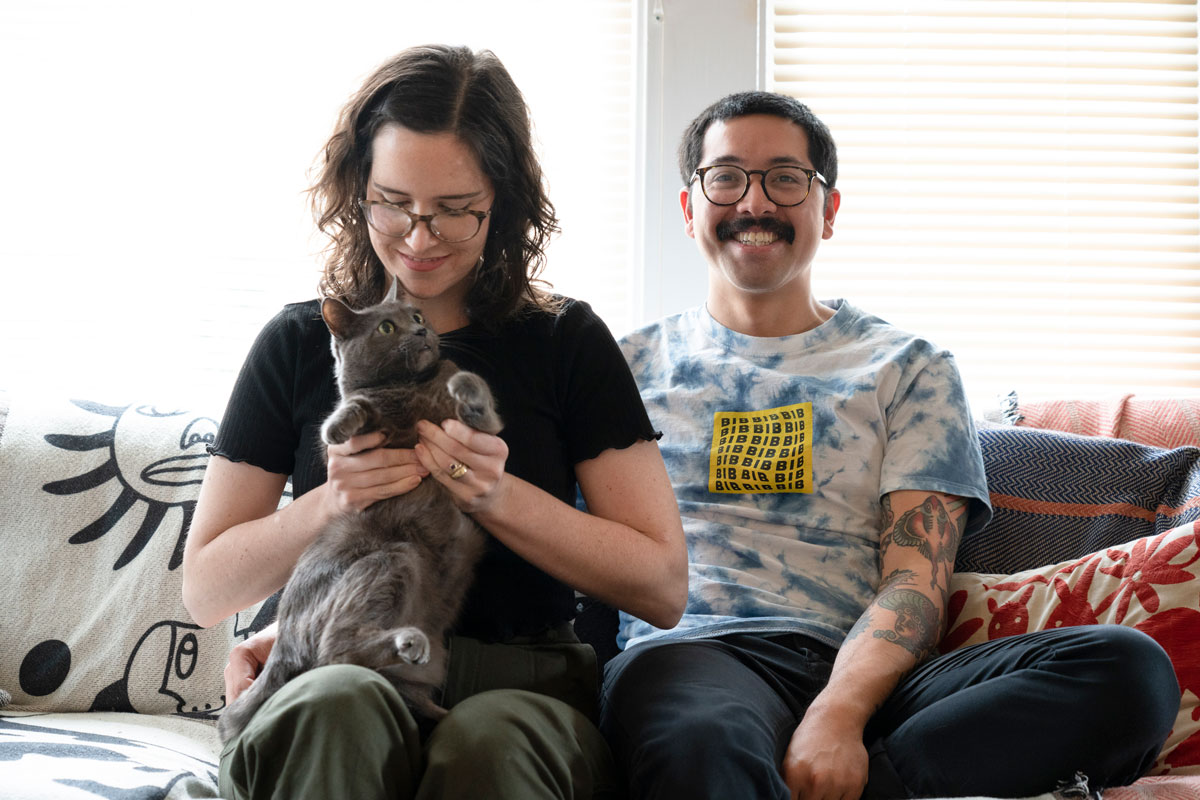
The Realities of Risk
Both agree things would be very different if Floss was their main source of income. “Growing up with immigrant parents, they prioritized me building skills for traditional work over creativity,” Gonzalez explains. “You asked that question, ‘Do we think that the work allows us to do Floss?’ And I think financially, very tangibly, yes it does. But I think internally I would feel some kind of guilt if I didn’t work.”
“I don’t think I would have entered into this world otherwise, if I didn’t have this safety net,” he says of the art book scene.
Fransee, who also does some freelance illustration work, does dream of being a full-time artist. “The reality is: I’m in public service loan forgiveness, so I’m kind of stuck,” she explains. She’s halfway into the 10-year program, making minimum payments of $500 a month on approximately $80,000 worth of grad school loans. But she also loves the work she does with OUSD, where she manages a caseload of about 25, making home visits and working with whole families, not just individual students.
With all these factors in the mix (the number of hours in a day, the square footage of their home), Floss Editions currently operates at capacity. It may not pay the rent, but it provides other artists with extremely well-made Risograph prints and books to sell. It creates objects that people love; their publications routinely sell out. And it’s taught both Fransee and Gonzalez that they are artists themselves, no matter the source of their income.
